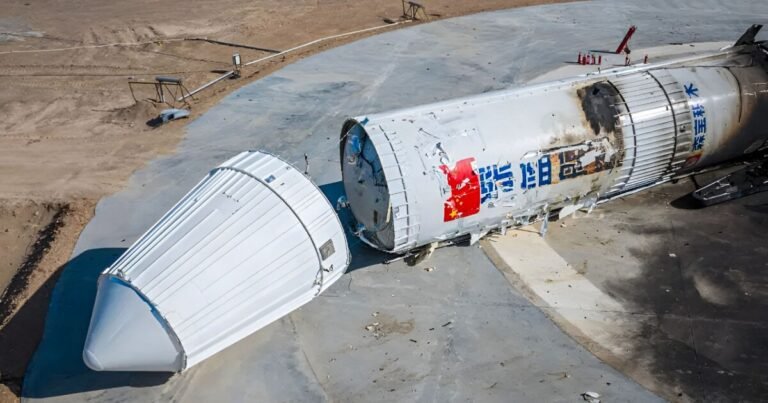China’s reusable first stage rocket booster, Xingyun-1, encountered a bit of trouble on September 22, 2024, when its near-perfect high-altitude vertical flight ended when it crashed to the ground and suffered a small dent during a powered landing attempt.
As SpaceX continues to perform powered landings with its reusable Falcon 9 boosters at an almost monotonous pace, it’s only natural that other companies will try to emulate it in the hopes of capturing similar commercial benefits. One such company is Deep Blue Aerospace, a privately held Chinese company based in China’s coastal Jiangsu province that has been developing its Nebula series of orbital rockets since 2016.
The test flight, which took place on Sunday from Deep Blue Aerospace’s Ejinbanar spaceport in Inner Mongolia, was aimed at testing the company’s Nebula 1 booster’s systems, its post-stage operation, and its ability to return to Earth and perform a powered landing. Powered by an open-cycle, variable-thrust Thunder 20 electric-pump-fed kerosene/liquid oxygen engine with 20 tons of thrust, the rocket has already completed a low-altitude test flight below 100 meters (330 feet) and is now on track to an altitude of 100 kilometers (62 miles).
The crash of Nebula 1
The latest test lasted 179 seconds and, according to Deep Blue, achieved 10 of the 11 flight objectives. Unfortunately, the 11th, a landing, didn’t go so well.
During the test, Nebula 1 took off using all three engines, then switched to only the center engine as it approached an undisclosed maximum altitude, after which it landed on the landing pad and began a slow descent on the center engine.
That’s when things got worse.
A post-flight analysis revealed that the rocket’s control system malfunctioned, and it attempted to land, but its engines shut down while it was still airborne. Nebula 1 crashed to Earth, but because it had already used up most of its fuel by that point, it is believed to have not exploded.
The company says it will use the results of this test for its next flight in November.
Source: Deep Blue




